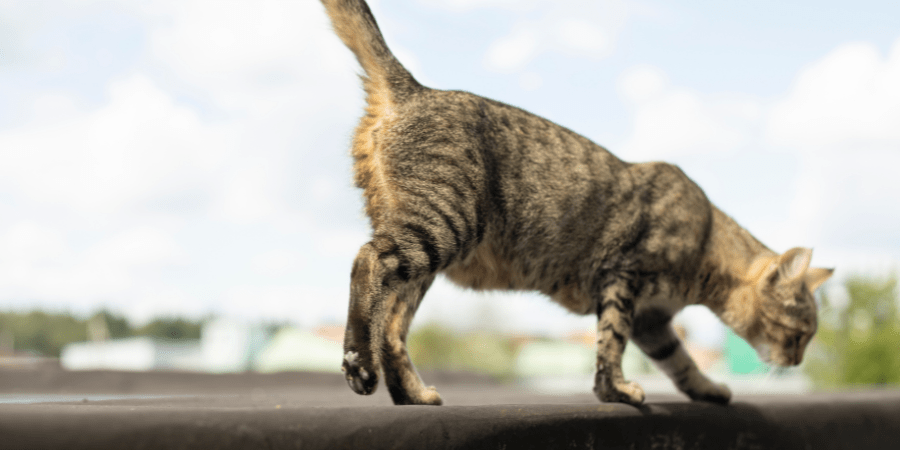We know cats for their independent and curious nature, so it’s no surprise that they wander away from home to explore their surroundings. But if your outdoor cat ventures off for hours – or even days – on end, you may be wondering the reason. Read on to learn more…
Ten reasons why your cat can go missing
-
They’re looking for a mate
Cats who aren’t neutered are much more likely to wander from home, as they often go in search of a mate. In fact, unneutered males and unspayed females go to great lengths to find another cat to mate with, and even indoor cats may try to escape their homes when the door or window is opened. Your cat might wander off for a few days, driven by their instincts, only to return home as if nothing happened.
Can go missing for: generally up to a week. However, the longer your cat takes to find a mate, the further from home they may end up.
-
They’re expanding their territory
Even though cats are territorial animals, the garden is not their only limit. Their ‘zone’ is usually much bigger and includes places where they eat, play, relax, and hunt. Male cats – especially unneutered ones – are more likely to roam further and establish new territory.
If there aren’t many other cats around in the neighbouring areas, they may take control of a new zone to grow their territory. If they’re busy making a bigger territory, they might be gone longer than you think before returning home.
Can go missing for: normally a few days but can be a week or more.
-
They’re hunting further afield
Even if your cat has plenty of food and toys at home, they may still feel the need to fulfil that basic hunting instinct. If your outdoor cat is a good hunter, they may go to new places to find prey, particularly if their territory lacks it. This curious behaviour can cause them to look in areas further than planned, sometimes making it hard to find their way back home.
Can go missing for: days to months, depending on how far a cat’s hunting desires may take them.
-
They’re stressed
Cats are very sensitive to stress. For cats living with other cats, one of the main sources of stress is very often tension or competition over resources like food, litter trays, or beds. This can lead them to seek out a new territory. They may not show obvious signs of this tension, but some cats can develop stress-related health issues, such as cystitis (inflammation in the bladder) or overgrooming.
Changes or disruptions at home can also be very stressful for cats. New family members, like a playful kitten or a crying baby, can make the home noisy and chaotic. So can construction work or decorating. During these times, your cat may retreat to a quieter, more stable place until things calm down – it’s their coping mechanism!
Can go missing for: a few hours or several days, but it can be longer if they are avoiding other cats or waiting for things to settle at home.
-
They’re sick
Drawing on their wild ancestry, cats will often hide signs of being sick or in pain, which helps them avoid looking vulnerable to predators. As a result, it can be difficult for owners to know that something is wrong. When your cat isn’t feeling their best, they might choose a safe place elsewhere to rest and focus on healing. Often, this is somewhere close to home and within their territory.
Can go missing for: undetermined. Some cats might not be able to return home if their health condition gets worse. It’s important to actively search for your cat because if they go unnoticed and are too weak to get food or walk home again, sadly, they could pass away in their chosen spot.
-
They’re injured
The great outdoors has many dangers for our feline friends, including other animals and moving cars. In fact, injuries from road traffic accidents (RTAs) and dog bites are some of the most common emergency cases our vets treat in our PDSA Pet Hospitals.
When cats are hurt, they feel weak and vulnerable. With certain injuries, they may not be able to move. But if they can, their survival instincts kick in and they’ll often try to find somewhere to hide from other predators or dangers.
Can go missing for: undetermined. In some cases, a cat might return home if they’re not too hurt. However, many injured cats are often found by witnesses or people walking by. Remember, an injured cat must be taken to a vet as soon as possible.
-
They’re lost in a new location
Moving home can be stressful for humans, but the transition can be even more challenging for our feline friends.
Cats are creatures of habit and thrive on routine and familiarity. When faced with the sudden upheaval of moving to a new home, they can feel disorientated, anxious, and confused. In a new area, all the unfamiliar scents, sounds, and sights can be extremely overwhelming. In their quest for comfort and safety, they may lose their bearings and end up lost.
Can go missing for: undetermined.

-
They’re seeking food, attention, or company
If your cat isn’t getting enough food, water, or love at home, they may choose to spend less time there.
For example, if your cat is left home alone for hours or days, they may run out of food and panic. Spurred on by hunger, they’ll wander off to find something to eat. Or maybe your cat is getting enough food at home, but a friendly neighbour is offering treats on the side! It’s best not to feed your neighbours’ cats without their permission, as this can encourage roaming or cause health issues, such as obesity.
Similarly, cats who feel overlooked or neglected may seek more interaction and attention outside the home.
Can go missing for: undetermined.
-
They’re trapped somewhere
Sometimes, missing cats are not lost but trapped. Unfortunately, their adventurous spirit can occasionally land them in trouble. If you haven’t seen your feline friend for longer than usual, it’s important to consider that they might be somewhere they can’t escape from.
Check common hiding places like garages and sheds. The intriguing smell of food or garden supplies often draws cats in, and it’s not uncommon for them to get stuck or for neighbours to accidentally shut them inside.
At PDSA, we don’t recommend putting collars on cats, as they can easily catch on objects outside, potentially causing your cat to become stuck. Instead, make sure your cat is microchipped, so they can be identified if found. If you do choose to put a collar on your cat, ensure it’s a quick-release collar to reduce the risk of accidents.
Can go missing for: undetermined.
-
They’ve been spooked
Bad weather and loud noises (e.g. fireworks) cause severe stress in cats. If they’re frightened by a sudden clap of thunder or an onset of fireworks, their natural response is to run away from the perceived danger. Should they bolt off far away in a state of panic, it may not be easy for them to find their way back home. To help prevent this, keep windows and doors shut and secure when fireworks or loud noises outside are expected, and provide a quiet, safe space indoors where your cat can hide and feel protected.
Can go missing for: a few hours to several days, depending on how far from home they are.
How do cats find their way home?
Cats have a strong homing instinct that helps them find their way home. This instinct is rooted in their evolutionary history, as their ancestors relied on being able to return to familiar places to survive in the wild.
While outside, your cat will remember the things they see, such as trees and buildings. They’ll also use their powerful sense of smell to understand more about their surroundings. It’s knowing all these sights and smells that enables them to retrace their steps back home.
However, a cat’s ability to do this can vary depending on how far they’ve wandered off and their age. Owners must know how to help with their safety and increase the chances of a happy reunion if their pet goes missing.

How to prevent your cat from going missing
While some cats may return not long after leaving, others may take a while to find their way back or become lost altogether. This uncertainty can be distressing for pet owners, who may feel a sense of guilt or worry about their cat’s wellbeing.
Sometimes, a cat can go missing for reasons beyond our control. However, there are actions we can take to lower the risk.
-
Have them spayed or neutered
A cat’s mating instinct is strong. Spaying or neutering your cat will help prevent them from going missing, as they’ll have less desire to find a mate.
However, spaying or neutering your cat does not mean they won’t want to go outside anymore.
-
Keep them indoors when necessary
If the forecast predicts bad weather, keep your cat indoors and do your best to help them feel safe during a storm.
Similarly, you should stop your cat from going outside when fireworks will go off repeatedly (e.g. Bonfire Night, Eid, and New Year’s Eve). Remember, pets cannot protect themselves, so it’s our responsibility to keep them safe. For our expert advice on keeping your pet calm during fireworks, download our free guide.
-
Take time to get them used to new surroundings
If you’ve just moved house (or are getting ready to), you’ll need to give your cat plenty of time to adjust to a new normal. You must approach the transition with care and consideration for your cat, as they can feel extremely stressed out by such a big change.
Fortunately, there are many ways to help your pet adjust to their surroundings and feel happy in a new home, which you can read about in our dedicated blog: Moving house with pets
-
Show them plenty of care, love, and attention
In addition to feeding your cat the right amount of nutritious food and giving them access to clean water and a litter tray at all times, you need to make your cat feel loved. Spending quality time with them strengthens your bond, helping your cat to feel safe and appreciated.
Whether it’s playing with their favourite toy or letting them curl up in your lap on the sofa, your cat will cherish being with you and may feel less inclined to find company elsewhere.
-
Check your cat’s microchip details are correct
One important step is to check that your cat's microchip details are correct, especially if you have moved address or changed your phone number. Microchipping is a simple and effective way to help reunite missing pets with their owners, but only if the information linked to the microchip is up to date.
Quick things you can do to help find your missing cat
- Check your house from top to bottom in case they’ve found themselves a new hiding spot.
- Call out your cat’s name and use some of their favourite treats to help lure them out.
- Search your immediate area, including gardens, tall trees, and porches.
- Reach out to your neighbours, especially other cat owners, and share your contact details so they can let you know of any sightings.
- Contact local vet practices, animal welfare groups, and rescue centres to ask if any cats have been found or brought in.
- Share an update on social media to let people know your cat has gone missing. Post a photo of them in local Facebook groups and encourage others to spread the word.
Read next: Lost and found pets: top tips for finding your pet
